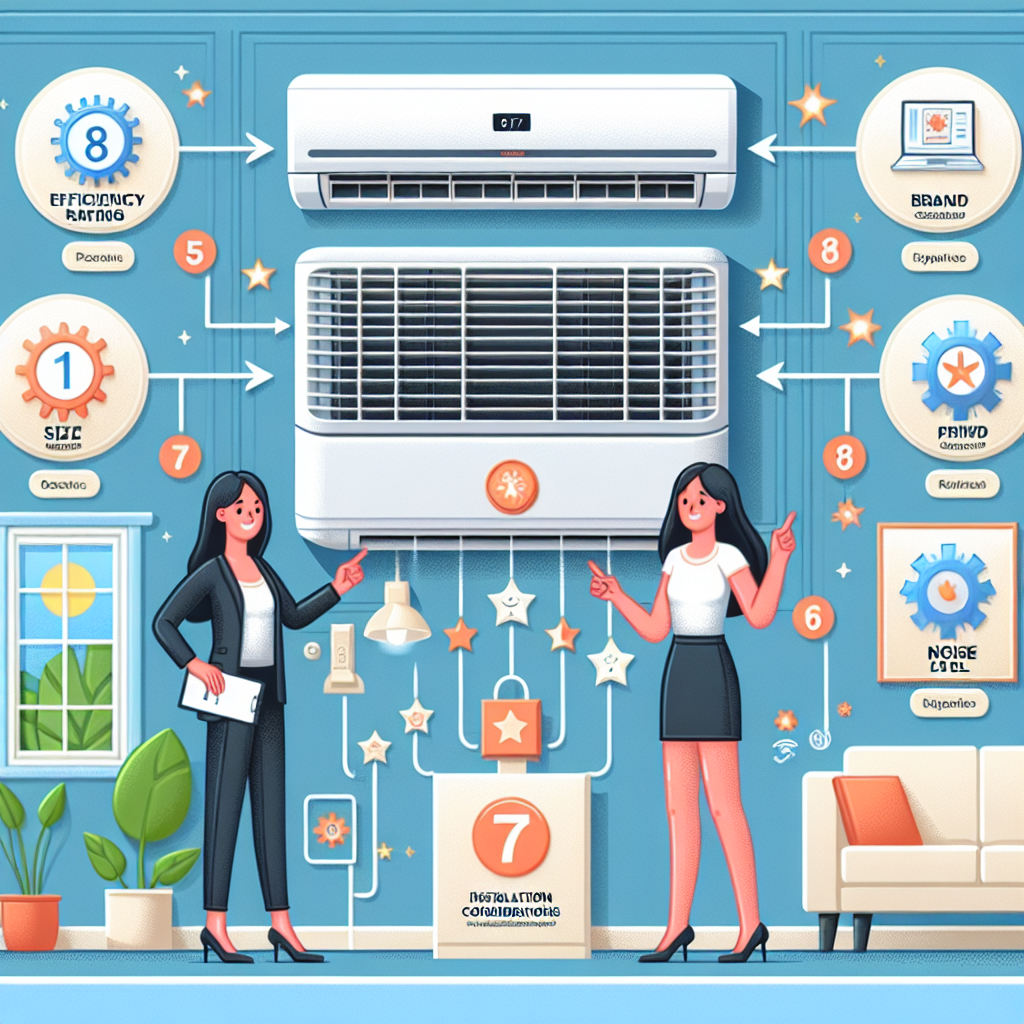When the sweltering heat of summer rolls in, having a reliable air conditioner (AC) can make all the difference in keeping your home comfortable. But with so many options available on the market, choosing the right AC unit can feel overwhelming. Here are seven key factors to consider when selecting an air conditioner, ensuring you make an informed decision that meets your needs.
1. Assess Your Space
Size Matters
The first step in selecting the right air conditioner is to assess the size of the space you need to cool. AC units are rated by their cooling capacity, typically expressed in British Thermal Units (BTUs). To find the right BTU rating for your room, consider the square footage. A unit that is too small will struggle to cool the space, while one that is too large can make your home feel damp and uncomfortable.
Measuring Your Room
A general rule of thumb is to allocate about 20 BTUs per square foot of living space. For example, a 500 square foot room will need an AC unit with a cooling capacity of at least 10,000 BTUs. However, consider other factors such as ceiling height, insulation quality, and the number of windows, as these can affect your cooling needs.
2. Energy Efficiency Ratings
SEER Ratings Explained
In today’s eco-conscious world, energy efficiency is a crucial factor when selecting an air conditioner. Look for the Seasonal Energy Efficiency Ratio (SEER) rating, which measures the unit’s cooling output during a typical cooling season divided by the energy consumed in watt-hours. The higher the SEER rating, the more efficient the unit.
Lower Energy Bills
An efficient air conditioner will not only reduce your environmental footprint but will also save you money on energy bills. For optimal performance, seek units with a SEER rating of 14 or higher, and consider ENERGY STAR-certified models to ensure maximum energy efficiency.
3. Type of Air Conditioner
Different Types Available
Air conditioners come in various types, each with its own set of benefits. Here are the most common options:
-
Central Air Conditioning: Best for cooling an entire home, central systems require ductwork but provide even cooling and quiet operation.
-
Window Units: Ideal for cooling single rooms, window units are cost-effective and easy to install.
-
Portable Air Conditioners: These versatile units are great for renters since they don’t require permanent installation. However, they may be less efficient for larger spaces.
- Ductless Mini-Splits: A fantastic option for homes without existing ductwork, they provide flexibility and energy efficiency.
Choose the type that best suits your living situation and cooling needs.
4. Noise Levels
Quiet Operation
One of the often-overlooked aspects of selecting an air conditioner is its noise level. Some units can be quite loud, which can be distracting when you’re trying to relax or sleep. Look for specifications that indicate noise levels, measured in decibels (dB).
Finding a Quiet Model
Units with lower dB ratings (below 60) are generally quieter and can make a significant difference in your comfort. Don’t hesitate to read reviews or consult with friends and family for recommendations on quieter models.
5. Features and Controls
Modern Conveniences
Today’s air conditioners come with a variety of features designed to enhance user experience and convenience. Some of the most sought-after features include:
-
Smart Thermostat Compatibility: Many new AC units can connect to smart home systems, allowing for remote operation via your smartphone.
-
Programmable Timers: These let you set specific times for the unit to turn on or off, helping you save energy when you’re not home.
- Multi-Zone Control: If you opt for a ductless mini-split system, look for models that allow you to control temperatures in multiple zones independently.
Evaluate which features are most important to you to make your life easier and your home more comfortable.
6. Installation Requirements
Professional vs. DIY
Another crucial factor is considering the installation requirements of the air conditioner. Central systems generally require professional installation, while window units may be simple enough for a DIY project. However, if you’re unsure about any installation process, especially with electrical components, hiring a professional is always a wise choice.
Hidden Costs
Don’t forget to factor in any installation costs in your budget. Some units come with installation kits, while others may need additional components, such as ductwork or electrical upgrades, which can add to the overall expense.
7. Budget Considerations
Finding Your Price Point
Last but certainly not least is your budget. Air conditioners come in a wide range of prices, from budget-friendly options to high-end models. It’s essential to find a balance between quality and cost.
Long-Term Investment
Remember, opting for a cheaper unit may save you money initially but might result in higher energy bills or quicker replacements down the line. Always factor in the long-term costs associated with energy efficiency and durability when making your decision.
Conclusion
Selecting the right air conditioner for your home doesn’t have to be a daunting task. By considering your space, energy efficiency, type of unit, noise levels, features, installation requirements, and budget, you can choose an air conditioning system that keeps you cool and comfortable for years to come.
When the heat is on, the last thing you want is to struggle with a poorly chosen air conditioner. Take the time to evaluate your options, and you’ll be glad you did when you can enjoy a cool and refreshing sanctuary at home.


